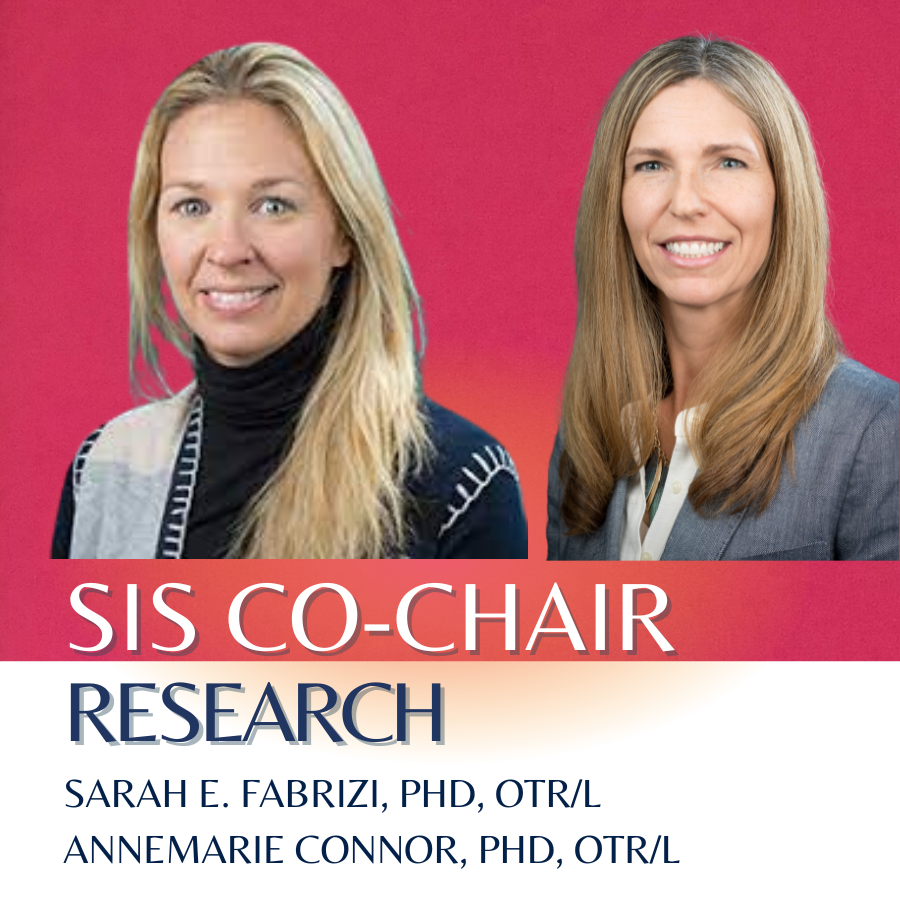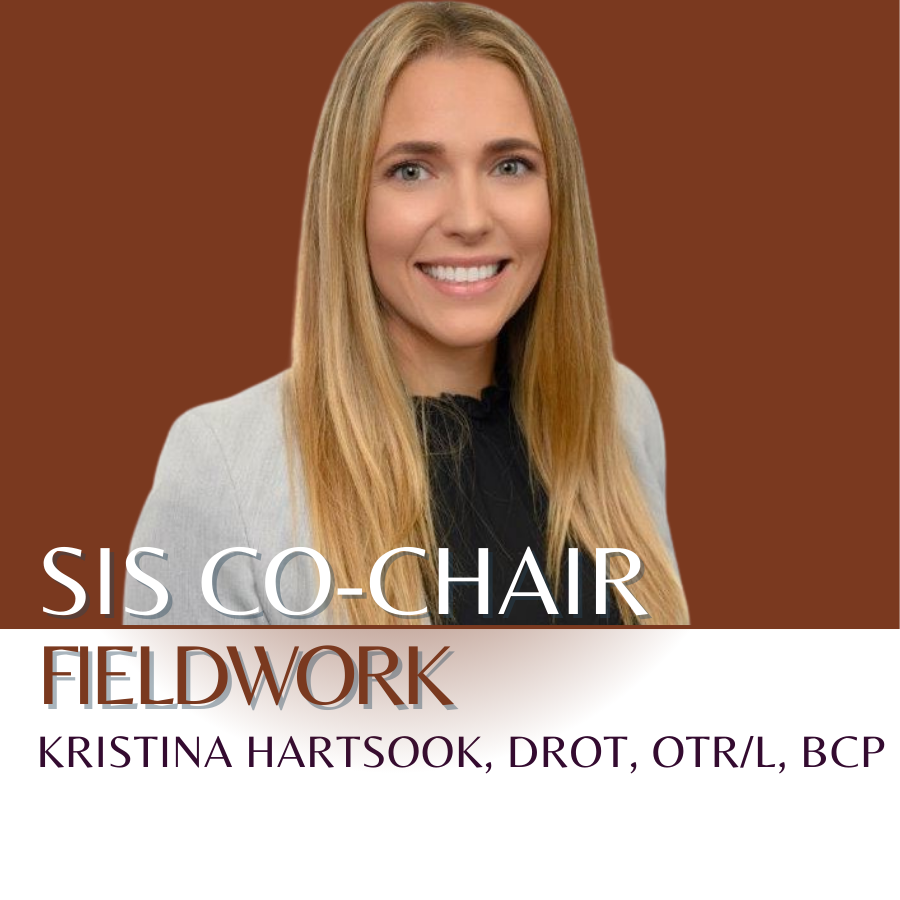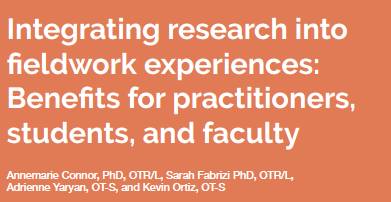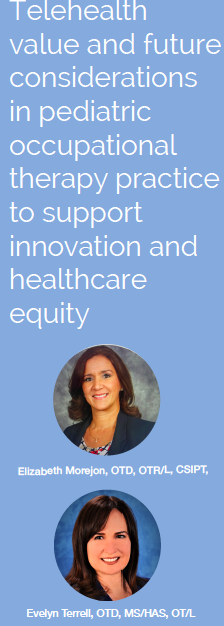Trends in Occupational Therapy Research and Practical Applications for Providers
 Trends in Occupational Therapy Research and Practical Applications for Providers
Trends in Occupational Therapy Research and Practical Applications for Providers
Research Special Interest Section
 Trends in Occupational Therapy Research and Practical Applications for Providers
Trends in Occupational Therapy Research and Practical Applications for Providers
Research Special Interest Section
 Transition from the IFSP to the IEP: The Changing Roles of the Occupational Therapy Practitioner in Part C vs Part B of IDEA
Transition from the IFSP to the IEP: The Changing Roles of the Occupational Therapy Practitioner in Part C vs Part B of IDEA
Pauline Kelly, OTD, OTR/L
 Occupational Therapy Gives a Smile for Life
Occupational Therapy Gives a Smile for Life
FLOTEC submission
 Establishing Fieldwork Site Objectives for Entry-Level Development
Establishing Fieldwork Site Objectives for Entry-Level Development
Antonette Fernandez, DrOT, OTR/L
 The Impact of Vestibular Processing on Attention and School Performance: A case study
The Impact of Vestibular Processing on Attention and School Performance: A case study
Dominique Blanche Kiefer, OTD, OTR/L, BCP
 Improving Patient Safety in Occupational Therapy
Improving Patient Safety in Occupational Therapy
Anna DeMarco
 Elevating Fieldwork Experiences: The Role of Evidence-Based Practice in Occupational Therapy
Elevating Fieldwork Experiences: The Role of Evidence-Based Practice in Occupational Therapy
Kristina Hartsook, DrOT, OTR/L, BCP
Empowering students in fieldwork: Building emotional intelligence skills through self-assessment
Lucerito R. Gonzalez, COTA/L, MSOTS
Decreasing Lymph Volume With the Use of Deep Oscillation Therapy
Candice D. Young E.d.S., COTA/L, CLT
The Experiences of Siblings of Individuals with Special Needs
Kim Dudzinski, EdD, OTR/L, Mary Stein, OT-S, Veronica Sarti, OT-S, Alexis Bellacera, OT-S, & Hannah Sbacchi, OT-S
 Home and community health therapy services post Public Health Emergency (PHE)
Home and community health therapy services post Public Health Emergency (PHE)
Amanda Kotolski, Ph.D., OTR/L
 A critique of the meshing hypothesis:
A critique of the meshing hypothesis:
Using Shulman’s knowledge domain theory to facilitate effective instruction

by: Anette Bullard, MEd, COTA/L and Anjali Parti, OTD, OTR/L
 Everyone has experienced having to power through the day after a night of not sleeping well with every aspect of the day feeling more challenging due to your lack of sleep. The National Institute of Health (2017) identifies sleep as one of the most important occupations for maintaining all aspects of health. In fact, the Centers for Disease Control and Prevention (2018) has recognized sleep deprivation as a public health problem with broad, negative effects on safe occupational performance. For the older adults the challenges brought on by age compounded with a lack of sleep can further decrease successful occupational performance. Many age-related changes tend to disturb patterns of sleep and the myth that older adults need less sleep is actually incorrect (Suni, 2022b). The older adult is confronted with additional sleep obstacles such as, chronic conditions, medications, diminished physical activity, and decreased cognitive exercise, all of which have all been associated with decreases in sleep satisfaction. The resulting downward spiral of poor sleep results in less successful occupational engagement. The Occupational Therapy Practice Framework includes ‘rest and sleep’ as an area of occupation and defining occupational therapy practitioners as qualified professionals to assist clients with the occupation of rest and sleep (American Occupational Therapy Association, 2020). This brief article seeks to assist practitioners with identifying resources and awareness for more consistently addressing the occupation of sleep in the older adults.
Everyone has experienced having to power through the day after a night of not sleeping well with every aspect of the day feeling more challenging due to your lack of sleep. The National Institute of Health (2017) identifies sleep as one of the most important occupations for maintaining all aspects of health. In fact, the Centers for Disease Control and Prevention (2018) has recognized sleep deprivation as a public health problem with broad, negative effects on safe occupational performance. For the older adults the challenges brought on by age compounded with a lack of sleep can further decrease successful occupational performance. Many age-related changes tend to disturb patterns of sleep and the myth that older adults need less sleep is actually incorrect (Suni, 2022b). The older adult is confronted with additional sleep obstacles such as, chronic conditions, medications, diminished physical activity, and decreased cognitive exercise, all of which have all been associated with decreases in sleep satisfaction. The resulting downward spiral of poor sleep results in less successful occupational engagement. The Occupational Therapy Practice Framework includes ‘rest and sleep’ as an area of occupation and defining occupational therapy practitioners as qualified professionals to assist clients with the occupation of rest and sleep (American Occupational Therapy Association, 2020). This brief article seeks to assist practitioners with identifying resources and awareness for more consistently addressing the occupation of sleep in the older adults.
 The pelvic floor: The muscle group we all should know more about
The pelvic floor: The muscle group we all should know more aboutby: Sujata Martins, MS, OTR/L, CD
Out of sight, out of mind is a common saying for most and unfortunately tends to be applied to the pelvic floor. By learning to take care of our pelvic floor, most of us can avoid embarrassing accidents, as well as spending money on incontinence products, medications, and even surgery. It is also extremely valuable for pregnant women in order to prepare for delivery and postpartum healing, and plays an important role in intimacy.
 Integrating research into fieldwork experiences: Benefits for practitioners, students, and faculty
Integrating research into fieldwork experiences: Benefits for practitioners, students, and facultyby: Annemarie Connor, PhD, OTR/L, Sarah Fabrizi PhD, OTR/L, and Adrienne Yaryan, OT-S, and Kevin Ortiz, OT-S
As new occupational therapy programs continue to develop, it has become more difficult to find fieldwork (FW) sites for students since practitioners are less willing to supervise students due to the lack of resources, limited time, and questions of student preparedness (Varland et al., 2017). Unfortunately, this predicament is now exacerbated in the era of COVID-19. Emerging practice fieldwork sites, largely focused on prevention and health promotion in community-based practice, have been one mechanism for creating meaningful and productive fieldwork sites during this increasingly challenging landscape (Clarke et al., 2015; Dancza et al., 2013).
 Telehealth value and future considerations in pediatric occupational therapy practice to support innovation and healthcare equity
Telehealth value and future considerations in pediatric occupational therapy practice to support innovation and healthcare equityby: Elizabeth Morejon, OTD, OTR/L, CSIPT, and Evelyn Terrell, OTD, MS/HAS, OT/L

Amazon searches starting from www.flota.org benefit FOTA!